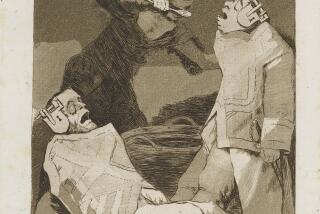Ah . . . Fantasies of the Cinema and the AYAR Syndrome
- Share via
I have commented before on the proliferation of improbabilities in movies. I don’t mean that the whole plot is improbable, which it often is; I mean those cliches of minor improbability that occur over and over again.
For example, there is always a parking place in front of the apartment building, when, as we know, in real life there is never a parking place. Keys are always left conveniently in cars, making the vehicles easy to steal by villains making a getaway; when leaving restaurants in a hurry, actors always pay with loose bills pulled from their coat pockets--evidently they have the exact amount tucked away since they never wait for change. I assume they leave a big tip.
I don’t believe I have ever seen an actor pay for lunch or dinner with a credit card, though that is by far the most common method in life today; naturally, we don’t want to wait while the waiter goes off with the credit card and returns with the check, which our hero must sign.
By far the most common and irksome cliche, though, is the question, “Are you all right?” This is not in itself an improbability, but the circumstances in which the question is asked usually make it absurd.
As I say, I have complained about this before, but I had not really made a study of the cliche. I only observed that the question had become more and more common, probably because of the high incidence of action pictures in which a character is shot, bludgeoned, thrown off a balcony, knifed, hit by a train, beaten up by thugs or dropped from a balloon.
As this unhappy fellow lies on the sidewalk in a bloody heap, some friend or passerby invariably comes to his side and says, “Are you all right?”
It is not new. I occasionally watch old movies on the American Movie Classics channel, and I have heard “Are you all right?” in many such instances. The difference is that movies were not so violent in the 1930s, so there were fewer occasions for asking “Are you all right?”
The movies of the 1930s were more sophisticated. At least they had a surface sophistication, like the series in which William Powell and Myrna Loy played Nick and Nora Charles. There was more small talk than plot in these so-called mysteries, and I’m sure the Charleses could have thought of something clever to say while the waiter was fetching the credit-card bill.
I can’t remember whether Nora ever said “Are you all right?” to Charles, but she well may have when he knocked himself out by bumping into a lampshade or drinking too much gin. Dr. Paul R. Miller has made an informal study of the “Are-you-all-right?” question, which he calls AYAR.
“My research,” Miller says, “reveals that the more times AYAR occurs, the worse the movie. ‘Ghost,’ the worst movie of 1990, (recently nominated for an Academy Award for Best Picture, by the way), had nine AYARs. ‘Die Hard 2,’ the second-worst movie, had six, while ‘Hamlet’ had none. Other fine movies, including ‘Awakening,’ ‘Reversal of Fortune,’ ‘Mr. and Mrs. Bridge’ and ‘Dances With Wolves,’ had two or fewer AYARs.
“The interpretation is not difficult. Movies with lots of AYARs are either action-oriented (ask the guy who has just been shot or knocked unconscious AYAR) or soap operas (even simple states of mind and health have to be pointed out to the audience).
“Films that successfully evoke a wide range of feelings and responses do not require kindergarten-style attention focusing, which is the point of AYAR.”
It is even worse than I thought. I’m gratified, though, to learn that the new film version of “Hamlet” does not succumb to this screenwriter’s addiction. There’s a perfect opportunity for it, too.
In Act V, when Hamlet is dying, he says, “Oh, I die, Horatio; the potent poison quite o’er-crows my spirit. . . . The rest is silence.”
Horatio says, “Now cracks a noble heart. Good night, sweet prince, and flights of angels sing thee to thy rest!”
If Shakespeare were writing today, Horatio would have said, “Are you all right?”
I was watching “Roadblock” the other day on the American Movie Classics channel. It’s a 1931 B movie about an insurance investigator (Charles McGraw) who goes bad and conspires in a train robbery so he can afford the gold digger he loves. He calls Western Union from a phone booth to send a telegram, but he doesn’t identify himself or otherwise arrange to pay for the telegram.
Try that sometime and see if your message gets through.
By the way, it turns out the girl doesn’t care about the money; she loves him for himself alone.
More to Read
Only good movies
Get the Indie Focus newsletter, Mark Olsen's weekly guide to the world of cinema.
You may occasionally receive promotional content from the Los Angeles Times.







